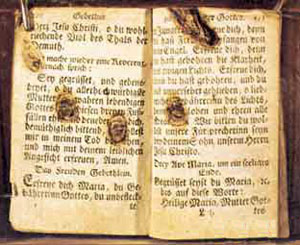
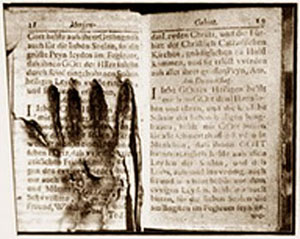
LOWEST PURGATORY
Adapted from After Life:
How does God determine if we go to Purgatory and at what level?
Humans are unable to judge where anyone will go. God's judgments are different from those of the world. He takes into account infinite factors. He takes into account things we would never know or even think of. He takes into account hidden burdens as well as obvious factors like character and temperament. He takes into account the wisdom we're raised with. He takes into account our genetic baggage. Only He knows how much He must purify us because only He knows the secret recesses of a soul.
This much we can surmise: at the lowest reaches of Purgatory, in the bowels of the earth, are those who have very seriously offended God and would have gone to Hell but for last-minute mercy, last-minute repentance, last-minute reprieve. At the low level are probably murderers, occultists, abortionists, rapists, child molesters, thieves, tyrants, sadists, and those involved in various criminal activities.
A safe bet is that you'd also find repentant adulterers, sodomists, and idolaters.
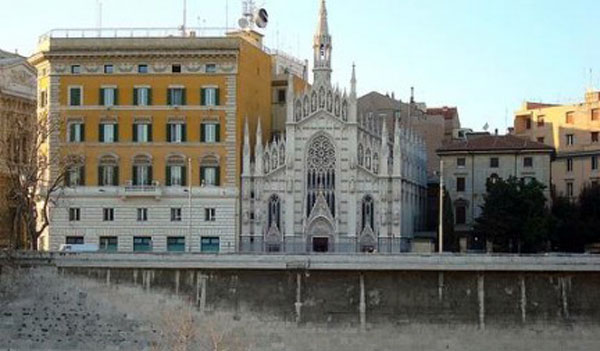
No matter the sin, if a person repents he is saved from the eternal fire and instead finds his way to the fire of purgatory.
But what a fire it is! It's always described as hotter than any earthly fire. There, an hour of torment is more terrible than an entire lifetime of suffering on earth. I've seen descriptions of souls who are in a covered well full of fantastic heat and there are accounts of departed souls who've returned as apparitions and done such things as leave a burnt hand mark on a wood door as if with a red-hot iron. When Drythelm saw the valley there was "all fire on one side, all ice and snow on the other; on the one hand braziers and caldrons of flame, on the other the most intense cold and the blast of a glacial wind. This mysterious valley was filled with innumerable souls, which, tossed as by a furious tempest, threw themselves from one side to the other. When they could no longer endure the violence of the fire, they sought relief amidst the ice and snow; but finding only a new torture, they cast themselves again into the midst of the flames."
It may surprise you that there's fire in Purgatory but such is mentioned by many mystics. God purifies with His fire, and the lowest levels of Purgatory are similar to Hell. The soul may even have a disfigured or beastly quality but unlike Hell those who are at any level of Purgatory bear the consolation of knowing their souls are saved and that one day they'll be allowed into Heaven. No matter the intensity of their suffering (and it is intense) there is the consoling realization that God exists and that one day they will be in His Presence.
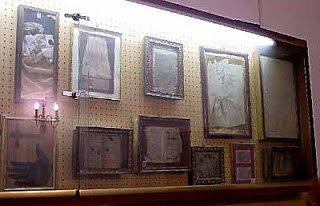
The sentences God metes out rely on innumerable factors but one might surmise that lowest Purgatory also has its share of liars, conmen, philanderers, false prophets, fortunetellers, money-grabbers, and those who have repented but not yet expiated for their misdeeds. Just as we can never judge the destination of a particular soul, neither can we take sin and neatly categorize it. It's not possible to give a roadmap of where sin will lead in the afterlife. It depends on God. It depends on what we have accumulated and what we have cleared through Confession.
The best I can do is present the comments of those who claim to have seen Purgatory.
One woman who tried to commit suicide in 1991 recalled a death experience in which she landed on a shadowy plane with black mist swirling around her.
The mist formed a barrier that kept her prisoner and it was like space but without a single glimmering star.
What comes to mind again is the "outer darkness" referred to by Christ in Matthew8:12, for the fog-like mist had mass -- "it seemed to be formed of molecules of intense darkness" -- and the woman, Angie Fenimore, saw men and women of all ages but no children.
The people were squatting or wandering around and there seemed to be a darkness that flowed from deep within them. They were crippled by it. They were so absorbed with it, so caught up in their own woe, that they didn't want to participate in mental or emotional exchange.
Some wore dirty white robes. Others were deeply soiled. They were there to admit and understand the mistakes in their lives and it was a place, she said, of stifling torment "that awaited me for taking my own life."
From the Soviet Union came a similar account of a man whose sin was atheism. Like suicide, atheism robs God of His role as Creator and landed the man, a medical doctor named George Rodonaia, in a very frightening place when he "died" in 1976 after being hit by a car.
Dr. Rodonaia (now a Christian minister in the U.S.) was dead for hours, until a pathologist began to cut his abdomen during an autopsy!
Like Angie he had found himself in a realm of total darkness. The gloom was absolute, "darker than any dark, blacker than any black," and he was both shocked and horrified.
He was shocked that he existed without a body and horrified at the void in which he found himself.
It was only when he turned from his negativity that the Light of God broke that awful darkness.
St. Catherine of Genoa informed us that "souls in a state of purification are tormented to the point that words cannot describe, nor can any intelligence give even the slightest idea unless God manifests this through a special grace."
While certain purgatories are not so bad, at the low places, at the deep levels, it's very trying. In 1873 a holy nun identified only as Sister M. de L.C. in a French convent began to hear prolonged sighs beside her. The strange noises from an invisible presence went on and came nearer. In February of 1874, after much prayer and many Communions, the presence finally identified itself to Sister M as the spirit of a second nun we'll call Sister O who had also been at the convent but who died several years before and was now in Purgatory.
"Great sinners who were indifferent towards God, and religious who were not what they should have been, are in the lowest stage of Purgatory," revealed Sister O. "While they are there, the prayers offered up for them are not applied to them. Because they have ignored God during their lives, He now in His turn leaves them abandoned in order that they may repair their neglectful and worthless lives. While on earth one truly cannot picture or imagine what God really is, but we in Purgatory know and understand Him for what He is, because our souls are freed from all ties that fettered them and prevented them from realizing the holiness and majesty of God, and His great mercy. We are martyrs, consumed as it were by love. An irresistible force draws us towards God Who is our center, but at the same time another force thrusts us back to our place of expiation.
"We are in a state of being unable to satisfy our longings. Oh, what a suffering that is, but we desire it and there is no murmuring against God here. We desire only what God wants. You on earth, however, cannot possibly understand what we have to endure. I am much relieved as I am no longer in the fire. I have now only the insatiable desire to see God, a suffering cruel enough indeed, but I feel that the end of my exile is at hand and that I am soon to leave this place where I long for God with all my heart.
"I can tell you about the different degrees of Purgatory because I have passed through them. In the great Purgatory there are several stages. In the lowest and most painful, like a temporary Hell, are the sinners who have committed terrible crimes during life and whose death surprised them in that state. It was almost a miracle that they were saved, and often by prayers of holy parents or other pious persons. Sometimes they did not even have time to confess their sins and the world thought them lost, but God, Whose mercy is infinite, gave them at the moment of death the contrition necessary for their salvation on account of one or more good actions which they performed during life. For such souls, Purgatory is terrible. It is real Hell, with this difference, that in Hell they curse God, whereas we bless Him and thank Him for having saved us.
"Next to these come the souls, who though they did not commit great crimes like the others, were indifferent to God. They did not fulfill their Easter duties and were also converted at the point of death. Perhaps they were unable to receive Holy Communion. They are in Purgatory for the long years of indifference. They suffer unheard of pains and are abandoned either without prayers or if they are said for them, they are not allowed to profit by them.
"In the second Purgatory are the souls of those who died with venial sins not fully expiated before death, or with mortal sins that have been forgiven but for which they have not made entire satisfaction to the Divine Justice. In this part of Purgatory, there are also different degrees according to the merits of each soul.
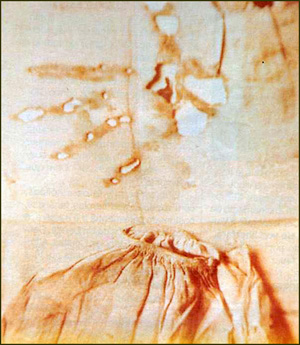

"Lastly, there is the Purgatory of desire which is called the Threshold. Very few escape this. To avoid it altogether, one must ardently desire Heaven and the Vision of God. That is rare, rarer than people think, because even pious people are afraid of God and have not, therefore, sufficiently strong desire of going to Heaven. This Purgatory has its very painful martyrdom like the others. The deprivation of the sight of our loving Jesus adds to the intense suffering. It is a continuous martyrdom. It makes me suffer more than does the fire of Purgatory. It is so beautiful in Heaven. There is a great distance between Purgatory and Heaven. We are privileged at times to catch glimpses of the joys of the blessed in paradise, but it is almost a punishment. It makes us yearn to see God. In Heaven it is pure delight; in Purgatory, profound darkness. Oh, how I desire to go to Heaven! What a martyrdom we suffer once we have seen God!"
-- M. Brown
http://www.spiritdaily.net/Afterlife2015d.htm
Purgatory Museum in Rome http://www.traditioninaction.org/religious/e048-Museum_1.htm



No comments:
Post a Comment